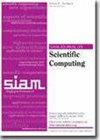Multigrid Methods Using Block Floating Point Arithmetic
IF 2.6
2区 数学
Q1 MATHEMATICS, APPLIED
引用次数: 0
Abstract
SIAM Journal on Scientific Computing, Ahead of Print.Abstract. Block floating point (BFP) arithmetic is currently seeing a resurgence in interest because it requires less power and less chip area and is less complicated to implement in hardware than standard floating point arithmetic. This paper explores the application of BFP to mixed- and progressive-precision multigrid methods, enabling the solution of linear elliptic partial differential equations (PDEs) in energy- and hardware-efficient integer arithmetic. While most existing applications of BFP arithmetic tend to use small block sizes, the block size here is chosen to be maximal such that matrices and vectors share a single exponent for all entries. This is sometimes also referred to as a scaled fixed point format. We provide algorithms for BLAS-like routines for BFP arithmetic that ensure exact vector-vector and matrix-vector computations up to a specified precision. Using these algorithms, we study the asymptotic precision requirements for achieving discretization-error-accuracy. We demonstrate that some computations can be performed using only 4-bit integers, while the number of bits required to attain a certain target accuracy is similar to that of standard floating point arithmetic. Finally, we present a heuristic for full multigrid in BFP arithmetic based on saturation and truncation that still achieves discretization-error-accuracy without the need for expensive normalization steps of intermediate results.
使用分块浮点运算的多网格方法
SIAM 科学计算期刊》,提前印刷。 摘要。与标准浮点运算相比,块浮点运算(Block floating point,BFP)所需功耗更低、芯片面积更小、硬件实现更简单,因此目前正重新引起人们的兴趣。本文探讨了 BFP 在混合精度和级数精度多网格方法中的应用,使线性椭圆偏微分方程 (PDE) 的求解采用节能和硬件效率高的整数运算。大多数现有的 BFP 算法应用倾向于使用较小的块大小,而这里选择的块大小是最大的,这样矩阵和向量的所有条目都共享一个指数。这有时也被称为按比例定点格式。我们为类似 BLAS 的 BFP 算术例程提供了算法,确保在指定精度内进行精确的向量-向量和矩阵-向量计算。利用这些算法,我们研究了实现离散化误差精度的渐进精度要求。我们证明,某些计算只需使用 4 位整数即可完成,而达到特定目标精度所需的位数与标准浮点运算的位数相似。最后,我们提出了一种基于饱和与截断的全多网格 BFP 算法启发式,无需对中间结果进行昂贵的归一化步骤,即可实现离散化误差精度。
本文章由计算机程序翻译,如有差异,请以英文原文为准。
求助全文
约1分钟内获得全文
求助全文
来源期刊
CiteScore
5.50
自引率
3.20%
发文量
209
审稿时长
1 months
期刊介绍:
The purpose of SIAM Journal on Scientific Computing (SISC) is to advance computational methods for solving scientific and engineering problems.
SISC papers are classified into three categories:
1. Methods and Algorithms for Scientific Computing: Papers in this category may include theoretical analysis, provided that the relevance to applications in science and engineering is demonstrated. They should contain meaningful computational results and theoretical results or strong heuristics supporting the performance of new algorithms.
2. Computational Methods in Science and Engineering: Papers in this section will typically describe novel methodologies for solving a specific problem in computational science or engineering. They should contain enough information about the application to orient other computational scientists but should omit details of interest mainly to the applications specialist.
3. Software and High-Performance Computing: Papers in this category should concern the novel design and development of computational methods and high-quality software, parallel algorithms, high-performance computing issues, new architectures, data analysis, or visualization. The primary focus should be on computational methods that have potentially large impact for an important class of scientific or engineering problems.

 求助内容:
求助内容: 应助结果提醒方式:
应助结果提醒方式:


